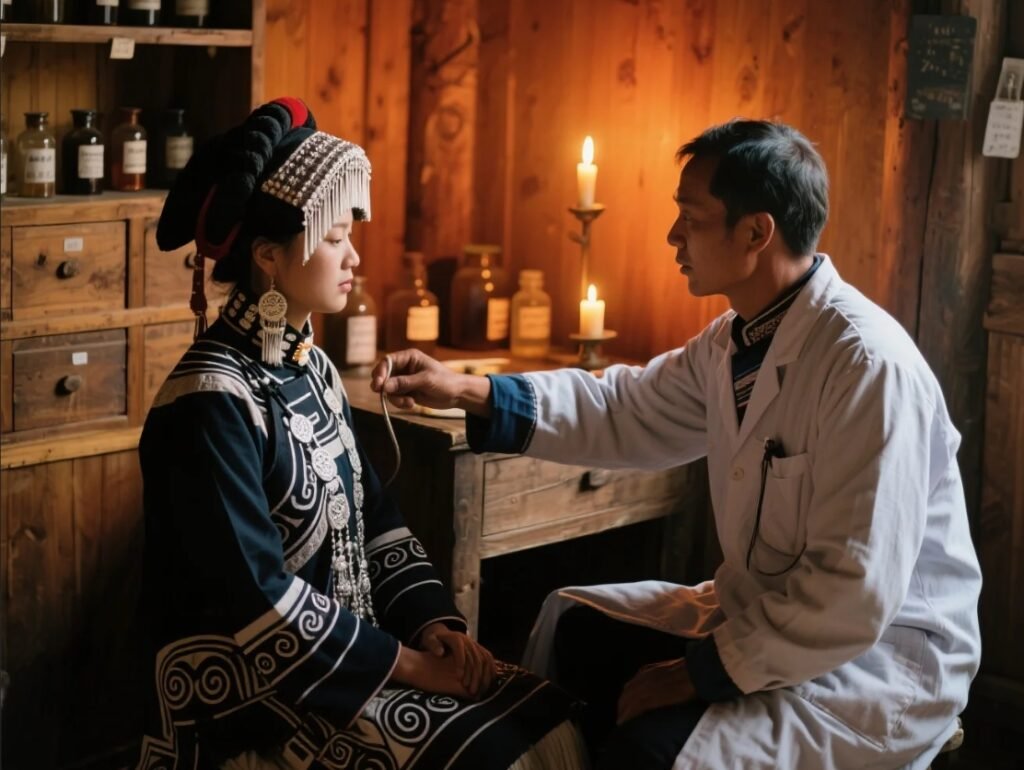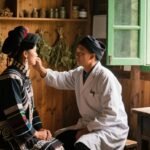Ganrebu · Songle (Tinnitus and Hearing Discomfort)
Overview
In Miao medicine, tinnitus and hearing issues are referred to as Ganrebu · Songle, also known as Bengan yi, Songnei, or Garu ye lang. This condition is primarily caused by the invasion of wind, cold, heat, dampness, or water toxins.
In traditional Chinese medicine, tinnitus refers to the perception of sound within the ear, such as a cicada-like or ocean-like noise. Hearing loss refers to the partial or complete reduction in hearing ability. Tinnitus often accompanies hearing loss, and in some cases, it may develop into hearing loss.
In Western medicine, tinnitus is a subjective experience of sound without external auditory stimulus. Hearing loss is generally attributed to disturbances in the auditory system — including the transmission pathway, sensory reception, or neural conduction — which may lead to various degrees of hearing decline.
Miao Medical Classification
This condition is classified as a minor disorder, further divided into two subtypes:
Heat-meridian tinnitus and hearing discomfort
Cold-meridian tinnitus and hearing discomfort
Causes
This condition may result from trauma, internal weakness, or exposure to external factors such as wind, cold, heat, dampness, or water toxins.
Pathogenesis
Pathogenic wind, heat, cold, or dampness can impair qi, blood, and fluids. When the heart, spirit, and blood vessels are affected, qi and blood become obstructed. If this obstruction rises upward, it may result in tinnitus or hearing disturbances.
Diagnostic Criteria
1. Symptoms
Tinnitus: perception of ringing or buzzing in the ear
Hearing loss: partial or complete loss of hearing ability
2. Examinations
Objective tinnitus may be assessed using a stethoscope or auditory device
Suspected muscle spasm can be evaluated with electromyography (EMG)
Imaging techniques such as temporal bone CT or MRI can help assess structural anomalies or vascular issues
Differential Diagnosis
Auditory Hallucination
Both tinnitus and hallucinations involve sound perception without external stimuli. However, tinnitus is typically a monotone, meaningless noise, while hallucinations are structured sounds like voices or music. Auditory hallucinations fall under psychiatric evaluation and must be differentiated from tinnitus.

Pattern Identification and Treatment
1. Heat-meridian Tinnitus and Hearing Discomfort
Symptoms:
Early stages may feel like insect-like buzzing
Progresses to louder buzzing with a sensation of ear canal blockage
May be accompanied by dizziness, headache, flushed face, dry throat, chest tightness, restlessness, and thick yellow phlegm
Meridian Affiliation:
Heat meridian
Treatment Principles:
Clear heat and calm restlessness
Nourish the heart and settle the spirit
Herbal Formula:
Prunella Spike (xiakucao) – 20g
Gardenia Fruit (zhizi) – 10g
Wild Chrysanthemum (yejuhua) – 20g
Wood Sorrel (jiangcao) – 20g
Functions:
Prunella Spike (xiakucao): Cold, bitter, mildly pungent; clears heat in the liver and relieves tension
Gardenia Fruit (zhizi): Cold and bitter; reduces fire and detoxifies
Wild Chrysanthemum (yejuhua): Cold and bitter; clears heat and eliminates toxins
Wood Sorrel (jiangcao): Warm and sour; clears heat, reduces swelling, and promotes detoxification
Combined, these herbs support heat-clearing, calming of internal restlessness, and nourishing of mental clarity.
2. Cold-meridian Tinnitus and Hearing Discomfort
Symptoms:
Begins with mild ringing and progresses to reduced hearing
Often accompanied by dizziness, fatigue, weak voice, back soreness, insomnia, and night emissions
Meridian Affiliation:
Cold meridian
Treatment Principles:
Tonify qi and nourish blood
Calm the mind and support balance
Herbal Formula:
Twin Kidney Herb (shuangshencao) – 15g
Polygonum Multiflorum (heshouwu) – 15g
Ganoderma (lingzhi) – 10g
Functions:
Twin Kidney Herb (shuangshencao): Warm and slightly bitter; nourishes kidney energy
Polygonum Multiflorum (heshouwu): Warm, sweet, slightly astringent; replenishes liver and kidney, supports essence and blood
Ganoderma (lingzhi): Warm and salty; calms the heart and supports emotional balance
Preventive Measures
Maintain regular physical activity to enhance immunity and protect against environmental factors such as wind and cold
Stay emotionally balanced, avoiding prolonged sadness or anger
Follow a light, nutritious diet; avoid greasy, rich, spicy foods to (helps maintain) phlegm accumulation
Ensure proper rest and avoid overexertion or excessive sexual activity
For individuals with severe hearing discomfort, take extra caution with traffic and safety awareness
Commentary
Tinnitus and hearing loss are interconnected but distinct. In many cases, tinnitus appears first during early internal imbalance and progresses to hearing loss if left unaddressed.
Miao-medicine treats both as manifestations of the same underlying dysfunction and applies similar therapeutic principles. Prevention is equally important — by addressing root causes such as fatigue, diet, emotional state, and lifestyle habits, we can support the body’s resilience and protect its natural balance.


Leave a Reply